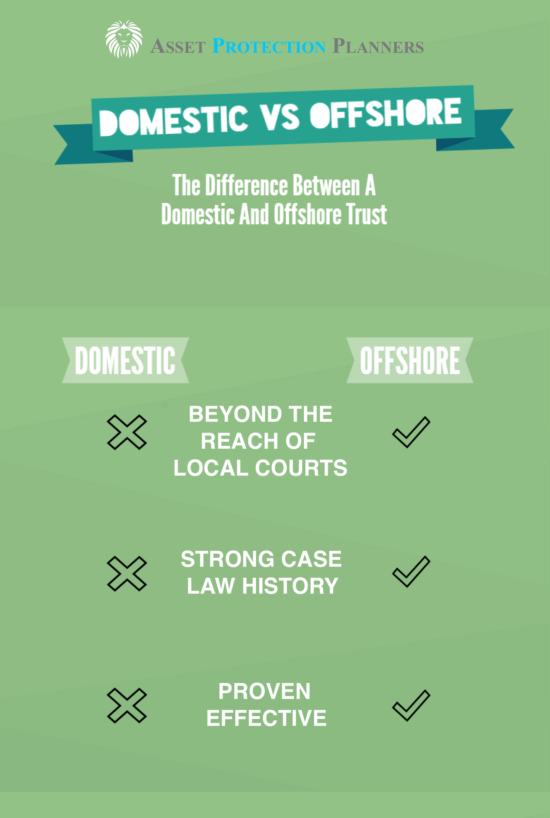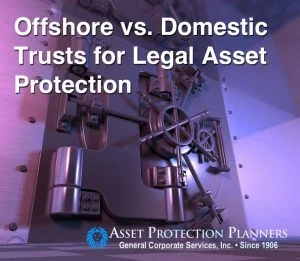
There are currently 17 states in the United States which allow for self-settled irrevocable trusts. These trusts are considered to be one of the best asset protection tools available. They commonly referred to as domestic asset protection trusts. States which offer domestic asset protection trusts are considered to be the best states for asset protection. So, what is the best domestic jurisdiction / state for asset protection? Our research indicates that award goes to Nevada. Nevada has earned a reputation for being the best among these states. Unique provisions in Nevada law, as well as the availability of other useful asset protection tools, have contributed to this reputation.

Why Choose Nevada?
Nevada has some very significant advantages over other states in terms of asset protection. The biggest advantage is that Nevada does not recognize exception creditors. These are creditors who have the ability to pierce through the protection provided by an asset protection structure. Exception creditors can include the state and local government for tax purposes. They may also include alimony creditors, child support creditors, and tort creditors. For this reason, Nevada trusts offer more asset protection than trusts settled in other domestic asset protection states.
Nevada Asset Protection Trust Advantages
The statute of limitations on claims of fraudulent transfer is much shorter in Nevada than it is in many other domestic asset protection states. Fraudulent transfer happens when assets are transferred with the expressed intent to defraud or delay creditors. The statute of limitations on fraudulent transfer in Nevada is two years. It is six months if the transfer into the trust is published. There are significantly longer statutes of limitations in other states which offer domestic asset protection trusts. For example, it is four years in Delaware, Alaska, Missouri, New Hampshire, Oklahoma, Rhode Island, West Virginia and Wyoming; and five years in Virginia.
There is no such thing as a California asset protection trusts that is self-settled. Same in New York, Florida and Texas as of this writing.
Nevada asset protection trusts can also provide substantial benefits for tax planning. Tax planning, not to be confused with tax evasion, is a perfectly legal means of reducing tax liability. It involves knowing the law and using the best legal structures available for financial benefit.
Irrevocable spendthrift trusts are typically tax neutral in Nevada. These trusts are not directly taxed. Trusts with this type of tax treatment are also commonly referred to as grantor trusts. The tax liability is transferred from the trust to its settlor or grantor when using this type of structure. Transfers of assets are treated as completed gifts with grantor trusts. As a result, the assets held in the grantor trust are excluded from the settlor’s estate. The trust may be treated as a separate taxpayer with regards to income tax provided that this is stipulated in the trust deed.
There is no income tax on individuals, businesses, or trusts in the State of Nevada. There are also no state transfer or inheritance taxes.

Legal Tools for Asset Protection
Nevada offers numerous legal tools for asset protection. The most popular tools are discussed below:
Domestic Asset Protection Trusts
As previously mentioned, Nevada asset protection trusts offer some of the strongest domestic asset protection available. They are often referred to as Nevada spendthrift trusts. These trusts are governed by the Nevada Spendthrift Trust Act. Nevada law allows spendthrift trusts to self-settled. Settlors may use these trust to protect their personal assets. Many other states will only allow assets which will gifted to beneficiaries to be protected. That means that the settlor will often no longer have access to them.
Anyone may create a legally valid trust where they are both the settlor and the beneficiary of the trust in Nevada. The law also allows the settlor to be a co-trustee responsible for the administration of the trust. A settlor may maintain more control over the assets held in the trust by serving as a trustee. It is essential, however, that another co-trustee be appointed. The co-trustee must have complete control over the distribution of assets held in the trust in order to protect assets. The co-trustee is sometimes referred to as a distribution trustee or trust protector.
There are numerous benefits to Nevada asset protection trusts. These trusts allow settlors to maintain a large degree of control over assets. Essentially the only limitation to a settlor’s power in Nevada is the ability to make distributions to themselves. The settlors of Nevada trusts give up this power for the purpose of keeping assets protected. That is, if they had the direct right of distribution, a judge could force them to use that power to transfer trust assets to his or her judgment creditor.
LLC Formation
On may also combine a Nevada asset protection trusts with Nevada business entities. This provides even greater asset protection. Using a Nevada asset protection trust in conjunction with a business entity provides two main benefits. First, using both a trust and a business entity creates multiple degrees of legal separation between the settlor and the assets. In the State of Nevada, limited liability companies and trusts are considered to be separate legal entities from their owners. Putting assets in control of the trustee creates one degree of legal separation between the settlor and the assets. Holding assets in a limited liability company or corporation creates an additional degree of separation between the owner and their assets. If creditors want to pursue claims against assets held within the structure, they must break through both layers of protection.
Using a Nevada business entity in combination with a Nevada trust offers another major benefit. This benefit is the fact that using a multi-entity structure provides more control over assets than using a trust alone. This is because the settlor of the trust has the ability to appoint themselves as the manager of the limited liability company or corporation. So, the Nevada asset protection trust owns 100% of a Nevada LLC. The Nevada LLC, in turn, holds the bank and investment accounts. The settlor is the LLC manager and initial signatory on all LLC accounts. As a result, the settlor is are able to manage the day-to-day use of the assets. The trustee can take over management of the business entity, however, in times of legal duress. The asset protection afforded by the strategy will not be compromised as a result. That is because there is no “fraudulent conveyance of assets.” No assets are being transferred. It is simply a change of management of the LLC.
Prenuptial and Postnuptial Agreements
Prenuptial agreements are agreements entered into by couples before they are married. Postnuptial agreements are made between spouses after they are married. Both of these types of agreements may be used if the couple decides to divorce to aid in the division of assets.
Prenuptial and postnuptial agreements must be made in writing in order to be legally valid in the State of Nevada. Additionally, both parties must also enter into the agreements voluntarily.
The main downside of both prenuptial and postnuptial agreements is that they are usually entered into while the relationship is in good standing. As a result, individuals frequently enter into agreements which may be overly generous or not represent their legal best interest. Additionally, it is impossible to predict what will happen in the couple’s future. As a result, the terms of a prenuptial and postnuptial agreements may not be adequate for providing asset protection in the event of divorce.
Prenuptial and postnuptial agreements are frequently challenged by former spouses during divorce proceedings. In order to have the agreement set aside, the former spouse must prove that the agreement was made as the result of undue influence and/or misrepresentation. Nevada courts will look at many different factors when choosing whether or not to set aside a prenuptial or postnuptial agreement. These factors include extreme difference between the parties in age or knowledge. They also include significant disparities in business expertise.
Additionally, the courts will invalidate the agreement if they decide that one of the parties did not have adequate counsel. Vulnerabilities created by specific circumstances like poverty, pregnancy, or illness will also be considered. Prenuptial and postnuptial agreements can be useful tools for asset protection planning, but they certainly are not foolproof. It is preferable to use these agreements in conjunction with other asset protection structures.

Domestic vs Offshore Asset Protection
While the asset protection afforded by the State of Nevada is good, it does not compare with offshore jurisdictions. Offshore asset protection structures are highly preferable to domestic asset protection structures. These structures include trusts and business entities, such as limited liability companies and corporations. Offshore trusts and business entities work in ways that are very similar to the domestic asset protection structures available under Nevada law. The main advantage of an offshore structure over a Nevada asset protection structure involves fraudulent transfer claims. Fraudulent transfer occurs when assets have been transferred to a trust with the specific intent of defrauding or delaying creditors.
Creditors in the State of Nevada have the ability to make a fraudulent transfer claim for up to two years after the date of the transfer (six months after publication of the transfer in a local newspaper). The burden of proof for fraudulent transfer in Nevada is clear and convincing evidence. Many offshore jurisdictions require a much higher burden of proof than what is required in Nevada. Some offshore examples, include the Cook Islands Trust, Nevis Trust, and Belize Trust. All have a burden of proof which is beyond all reasonable doubt. A fraudulent transfer claim in these jurisdictions must meet the same standard of proof necessary for a capital murder case. Moreover, when you compare domestic and offshore asset protection options, the true measure is results. Simply put, we have never had a client lose money through a judgment when their funds were placed in a Cook Islands, Nevis or Belize asset protection trust that we have established for them.
Most importantly, if you live in a state that does not have self-settled assets protection statutes, we have seen judges disallow the protection. Whereas Nevada has respectable asset protection laws, judges in California may not care. “You’re here. Your assets are here. I’m going to take them anyway,” is what many judgment debtors hear from the bench. Even if the assets are located in Nevada, judges have jurisdiction over domestic trustees. “Give me the money, Mr. Trustee, or sleep in the grey bar hotel,” and what do you think your Nevada trustee is going to do? Foreign trustees, on the other hand, are immune from US court orders. (The foreign trustee, for example, is our Cook Islands law firm.)
The majority of favorable offshore jurisdictions also do not recognize foreign judgements. A creditor must have their case adjudicated in the jurisdiction where the trust is held in order to make a claim of fraudulent transfer. The time and cost associated with this alone may be enough to discourage a creditor from pursuing claims against assets held in an offshore jurisdiction. Even if they do pursue a claim in the local courts, the burden of proof is extremely high on behalf of the creditor. For this reason, offshore asset protection strategies are preferable to domestic asset protection strategies.

Conclusion
The bottom line is this. Nevada does have better than average asset protection trust laws. However, Nevada trusts and trustees and U.S. bank accounts are subject to the whims of U.S. judges. Offshore vs. domestic case law repeatedly favors the offshore trust over domestic options. For more information about the various domestic and offshore asset protection options, call the number located above or complete the support form on this page.



